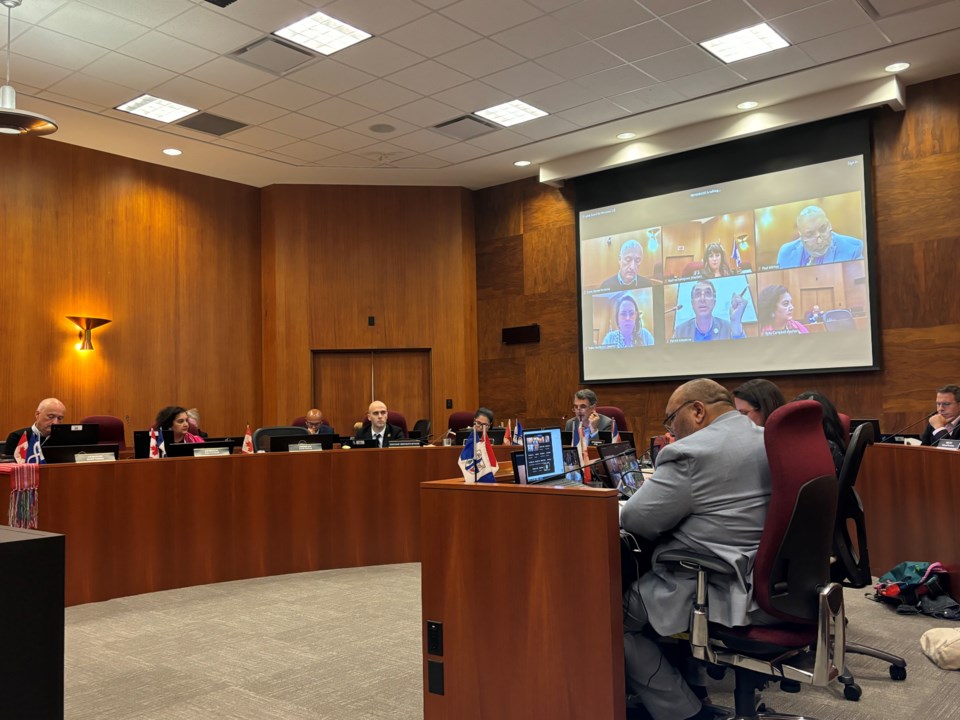Should the City of New Westminster continue to sell fuel credits if it joins in on a class action lawsuit against Big Oil?
That was one of the issues debated in council chambers Monday night during a discussion about taking part in a Sue Big Oil class action lawsuit. In a 4-2 vote, city council supported a motion from Coun. Tasha Henderson to have staff:
- Report back on the opportunity and cost for New Westminster to join the Sue Big Oil class action lawsuit and present potential costs and staff resource needs as part of the draft 2025 operating budget.
- Assess the cost of joining the Sue Big Oil class action lawsuit via the city’s climate action decision-making framework to determine the appropriate funding source.
Mayor Patrick Johnstone and councillors Ruby Campbell and Nadine Nakagawa supported Henderson’s motion, which was opposed by councillors Daniel Fontaine and Paul Minhas. You can read about that discussion here.
While debating the issue, Fontaine proposed an amendment to Henderson’s motion. He recommended the City of New Westminster immediately ban the acceptance of funds from Big Oil for any form of sponsorships or the sale of carbon credits.
“I think it's incumbent upon us to ensure that while we're suing Big Oil, we're not also accepting any cash from Big Oil,” he said. “I think we have to remain consistent.”
Johnstone said he did not have a problem with the sponsorship aspect of the motion, saying it would be “a symbolic thing” because the city does not take advertising money from oil companies in order to promote those companies. However, he was opposed to the part of Fontaine’s amendment related to the sale of carbon fuel credits.
“We are receiving low-carbon fuel credits in order to reduce the impact of climate change in our community, and making the polluter pay for that, with the only tool available for us to do that,” he said.
Johnstone said money received from the sale of low-carbon fuel credits is put into the city’s climate action reserve fund and goes towards the city’s efforts to address climate action.
While council unanimously supported the part of Fontaine’s amendment related to sponsorships, it voted 4-2 in favour of striking out the reference to carbon credits. Fontaine and Minhas opposed the removal of wording related to carbon credits.
Fontaine said it would be hypocritical for the city to sign on to a Sue Big Oil class action lawsuit and continue to accept money from those companies for carbon credits.
“That’s called, in my opinion, sucking and blowing at the same time, where one minute we’re suing them and then five minutes later we're taking a big cheque for carbon credits,” he said.
Fontaine said “there are other ways to force Big Oil to pay” than through the sale of carbon credits.
Johnstone stressed that carbon credits are not voluntary.
“They are forced by regulation to provide them,” he said. “So, it's not a voluntary thing on their front; they are forced to do it because they are polluters.”
In a 2022 news release, the City of New Westminster stated it had been earning fuel credits on an ongoing basis by providing electricity to propel SkyTrain and to charge electric vehicles. The city then sells those fuel credits.
In 2022, the City of New Westminster sold British Columbia Low Carbon Fuel Standard (BC LCFS) credits it had earned between 2013 and 2020 to Elbow River Marketing Ltd. for $26 million. The city used that money to establish a new climate action reserve fund to support New Westminster’s commitment to a zero carbon future.
“In B.C., suppliers of transportation fuels with a high carbon intensity (such as gasoline or diesel) are required to reduce the carbon intensity of their fuels,” said the city’s 2022 news release. “One option to do so is through the purchase of low carbon fuel credits, which are generated by suppliers of transportation fuels with a low carbon intensity (such as electricity or biodiesel). New Westminster earns BC LCFS credits as a Part 3 classified supplier due to having its own electrical utility, and offered its credits for sale to qualified proponents in a competitive process.”
According to LinkedIn, Elbow River Marketing operates as a wholesaler, transporter, supplier and marketer of liquid petroleum gases (propane, butane and condensate), crude oil, heavy fuel oil, and a growing portfolio of refined fuel and bio-fuel products.)
Henderson said she supports allowing the City of New Westminster to continue selling its carbon credits to get money for its climate action initiatives.
“The point of my motion is to take money from large oil companies to use towards climate action initiatives in the city. Through the sale of carbon credits, we take money from oil companies to use for climate action initiatives in the city,” she said. “They are exactly the same thing. We are asking oil companies to pay for the climate work that we need to do.”



